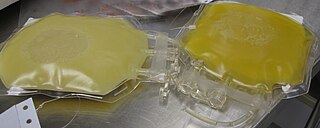An ejection fraction (EF) is the volumetric fraction of fluid ejected from a chamber with each contraction. It can refer to the cardiac atrium, ventricle, gall bladder, or leg veins, although if unspecified it usually refers to the left ventricle of the heart. EF is widely used as a measure of the pumping efficiency of the heart and is used to classify heart failure types. It is also used as an indicator of the severity of heart failure, although it has recognized limitations.

Hypercholesterolemia, also called high cholesterol, is the presence of high levels of cholesterol in the blood. It is a form of hyperlipidemia, hyperlipoproteinemia, and dyslipidemia.

Aviation medicine, also called flight medicine or aerospace medicine, is a preventive or occupational medicine in which the patients/subjects are pilots, aircrews, or astronauts. The specialty strives to treat or prevent conditions to which aircrews are particularly susceptible, applies medical knowledge to the human factors in aviation and is thus a critical component of aviation safety. A military practitioner of aviation medicine may be called a flight surgeon and a civilian practitioner is an aviation medical examiner. One of the biggest differences between the military and civilian flight doctors is the military flight surgeon's requirement to log flight hours.

Unstable angina is a type of angina pectoris that is irregular or more easily provoked. It is classified as a type of acute coronary syndrome.
The lipid hypothesis is a medical theory postulating a link between blood cholesterol levels and the occurrence of cardiovascular disease. A summary from 1976 described it as: "measures used to lower the plasma lipids in patients with hyperlipidemia will lead to reductions in new events of coronary heart disease". It states, more concisely, that "decreasing blood cholesterol [...] significantly reduces coronary heart disease".
The CHADS2 score and its updated version, the CHA2DS2-VASc score, are clinical prediction rules for estimating the risk of stroke in people with non-rheumatic atrial fibrillation (AF), a common and serious heart arrhythmia associated with thromboembolic stroke. Such a score is used to determine whether or not treatment is required with anticoagulation therapy or antiplatelet therapy, since AF can cause stasis of blood in the upper heart chambers, leading to the formation of a mural thrombus that can dislodge into the blood flow, reach the brain, cut off supply to the brain, and cause a stroke.

Ticagrelor, sold under the brand name Brilinta among others, is a medication used for the prevention of stroke, heart attack and other events in people with acute coronary syndrome, meaning problems with blood supply in the coronary arteries. It acts as a platelet aggregation inhibitor by antagonising the P2Y12 receptor. The drug is produced by AstraZeneca.

A myocardial infarction (MI), commonly known as a heart attack, occurs when blood flow decreases or stops in one of the coronary arteries of the heart, causing infarction to the heart muscle. The most common symptom is retrosternal chest pain or discomfort that classically radiates to the left shoulder, arm, or jaw. The pain may occasionally feel like heartburn. This is the dangerous type of Acute coronary syndrome.

Atrial fibrillation is an abnormal heart rhythm (arrhythmia) characterized by rapid and irregular beating of the atrial chambers of the heart. It often begins as short periods of abnormal beating, which become longer or continuous over time. It may also start as other forms of arrhythmia such as atrial flutter that then transform into AF.
John Eric Deanfield is a British professor of cardiology and past Olympic fencer.
Salim Yusuf is an Indian-born Canadian physician, the Marion W. Burke Chair in Cardiovascular Disease at McMaster University Medical School. He is a cardiologist and epidemiologist, and is well known for his cardiology-related clinical trial research. He also formerly served as president of the World Heart Federation. Yusuf has criticized the Dietary Guidelines for Americans and disputes the scientific consensus on dietary sodium and saturated fat intake.

James S. Forrester III is an American cardiologist. Born in Philadelphia, Pennsylvania, he received his medical training at the University of Pennsylvania, UCLA, and Harvard University. During the 1970s through 1990s, his research led to three major advancements in the practice of cardiology. Later in his career, he would return to UCLA, this time as a professor, while simultaneously being the Chief of the Division of Cardiology at Cedars-Sinai Medical Center. Forrester has published hundreds of papers and manuscripts dealing with the subject of cardiology, and is the recipient of numerous awards, including being the second person to ever receive the Lifetime Achievement Award of the American College of Cardiology in 2009.
Dan Tunstall Pedoe – "Dr Dan" and the "father of marathon medicine" – was a cardiologist who developed pioneering methods of diagnosis. He is popularly known for his contributions to sports medicine, particularly his support of the London Marathon.
Professor Aly Saad, is a professor of cardiology at Zagazig University and a member of the higher committee of promotion of professors and assistant professors of cardiovascular diseases and critical care subspecialty in Egypt.
Ulf Landmesser is a German specialist for cardiology and internal medicine. He is professor at the Institute for Health Research in Berlin and Head of the Medical Clinic of Cardiology at the Charité in Berlin. Landmesser is known for his work on coronary interventions and modern methods of catheter-based heart valve therapy.
Remnant cholesterol, also known as remnant lipoprotein and triglyceride-rich lipoprotein cholesterol is an atherogenic lipoprotein composed primarily of very low-density lipoprotein (VLDL) and intermediate-density lipoprotein (IDL) with chylomicron remnants. Elevated remnant cholesterol is associated with increased risk of atherosclerotic cardiovascular disease and stroke.

Stefan D. Anker is a German cariologist who is Head of Field “Tissue Homeostasis and Cachexia" at Charité University, Berlin, Germany. Previously, he was Professor of Innovative Clinical Trials at University Medical Center Göttingen in Germany. The main focus of the Innovative Clinical Trials department was research in the field of chronic heart failure, including the development and clinical testing of new therapies.

Sports cardiology is an emerging subspecialty field of Cardiology. It may also be considered a subspecialty field of Sports medicine, or alternatively a hybrid subspecialty that spans cardiology and sports medicine. Emergency medicine is another medical specialty that has some overlap with Sports Cardiology. Sports cardiology is now considered to be a distinct subspecialty in Europe and the USA, with a core curriculum developed in both regions. In Europe it has traditionally been grouped under Preventive Cardiology, but the subspecialty of Sports Cardiology is now considered a distinct field. In the USA, it has developed from being a special interest area to a distinct subspecialty as well.
Thomas F. Lüscher is a Swiss professor of cardiology, director of research, education and development and a consultant cardiologist at the Royal Brompton and Harefield NHS Foundation Trust and Imperial College London, and director of the Center for Molecular Cardiology at the University of Zurich.

Roberto Ferrari is an Italian cardiologist who holds the position of Emeritus Professor at the University of Ferrara, where besides he was the chair of the Cardiology in the School of Medicine until the 2019–2020 academic year.









